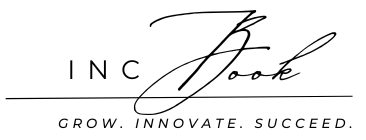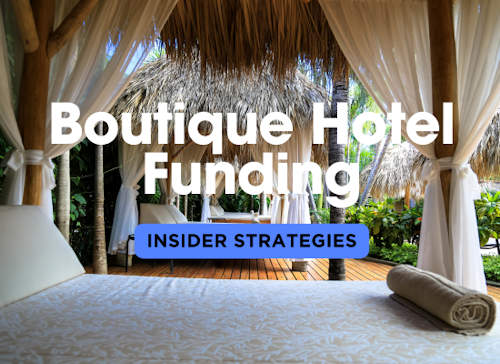Boutique hotels are all about offering a unique, personalized experience that sets them apart from the larger, chain-style establishments. Whether you’re dreaming of converting a historic building into a charming inn or creating a modern, themed retreat, the success of your boutique hotel depends not just on your vision but also on securing the right financing. Business loans tailored to boutique hotels can provide the capital needed to bring your one-of-a-kind hospitality project to life. In this article, we’ll explore the various types of loans available, their benefits, challenges, and essential tips to ensure you secure the best funding for your boutique hotel venture.
Hint: Make it to the end for insider tips!
| IncBook: Boutique Hotel Loan Type | Benefits | Challenges | Best for | Interest Rates | Typical Loan Amounts |
|---|---|---|---|---|---|
| Commercial Real Estate Loan | Finances the purchase or renovation of property specifically for boutique hotel use. | Long approval process; requires significant documentation and collateral. | Hotel owners looking to acquire or refurbish a unique property. | 3.5% – 7.5% | $500,000 – $10,000,000 |
| Construction Loan | Covers the costs of constructing a new boutique hotel from the ground up, including materials and labor. | Short-term loan; interest rates can be higher during construction phase. | Developers building a boutique hotel in a prime location. | 4.0% – 9.0% | $1,000,000 – $20,000,000 |
| SBA 7(a) Loan | Government-backed loan with flexible terms, ideal for purchasing or renovating boutique hotels. | Lengthy application process; may require a strong credit score. | Small businesses and entrepreneurs entering the boutique hotel market. | 5.5% – 8.0% | $250,000 – $5,000,000 |
| Bridge Loan | Provides short-term financing to cover the gap between buying a property and securing long-term funding. | Higher interest rates; must be repaid quickly, often within 6-12 months. | Hotel owners needing quick financing to secure a property before permanent financing is available. | 6.0% – 12.0% | $250,000 – $2,000,000 |
| Refinancing Loan | Allows hotel owners to refinance an existing loan, potentially lowering interest rates or monthly payments. | May extend the term of the loan, leading to more interest paid over time. | Established boutique hotels looking to improve cash flow or reduce expenses. | 3.0% – 6.5% | $500,000 – $10,000,000 |
| Renovation Loan | Finances the renovation or upgrade of an existing boutique hotel, focusing on enhancing guest experience. | Costs can escalate if the renovation uncovers unexpected issues. | Hotel owners seeking to refresh or modernize their property. | 4.0% – 8.0% | $100,000 – $5,000,000 |
| Working Capital Loan | Provides funds for day-to-day operations, including marketing, payroll, and inventory management. | Short-term loan with higher interest rates; requires a solid repayment plan. | Boutique hotels needing to manage cash flow during seasonal fluctuations. | 5.0% – 10.0% | $50,000 – $500,000 |
| Franchise Loan | Specifically for boutique hotel franchises, covering franchise fees, equipment, and initial setup costs. | Requires franchise approval; may include additional fees. | Entrepreneurs looking to open a boutique hotel under a well-known brand. | 5.5% – 9.0% | $100,000 – $3,000,000 |
Insider Tips
1. Leverage the Story Behind Your Property
- Tip: When applying for a loan, emphasize the unique story or historical significance of your property. Lenders are often more interested in projects with a compelling narrative, as it indicates strong market appeal. Whether it’s a century-old building or a themed hotel, crafting a narrative around your boutique hotel can make your loan application stand out.
- Why It’s Cool: A unique story adds value beyond the physical property, making it more attractive to both lenders and potential guests. It demonstrates that your hotel has a distinctive selling point, which can translate into higher occupancy rates.
2. Tap into Local Tourism Incentives
- Tip: Research local tourism boards or economic development agencies for incentives specifically aimed at enhancing the hospitality sector. Some regions offer grants, tax breaks, or low-interest loans to encourage the development of boutique hotels, especially in areas that are looking to boost tourism.
- Why It’s Cool: These incentives can significantly reduce your upfront costs or provide additional funding streams, making your project more financially viable and less risky for lenders.
3. Highlight Niche Market Appeal in Your Business Plan
- Tip: When drafting your business plan for loan applications, focus on the niche market your boutique hotel will serve. Whether it’s eco-tourism, wellness retreats, or art-centric stays, demonstrating a clear understanding of your target demographic can help convince lenders of your hotel’s profitability.
- Why It’s Cool: Lenders want to see that you’ve identified a specific, lucrative market segment. By showing that your hotel caters to a niche audience with disposable income, you increase your chances of securing favorable loan terms.
4. Collaborate with Local Artisans and Businesses
- Tip: Establish partnerships with local artisans, designers, and businesses to enhance the uniqueness of your boutique hotel. Highlight these collaborations in your loan application to show how they will enhance the guest experience and drive local support. Lenders appreciate projects that have strong community ties.
- Why It’s Cool: These partnerships not only make your hotel more distinctive but also demonstrate a commitment to the local economy, which can sway lenders in your favor.
5. Incorporate Sustainability Features for Better Loan Terms
- Tip: Consider integrating sustainability features like solar panels, energy-efficient lighting, and locally sourced materials into your hotel design. Many lenders offer better terms for green projects, especially those that contribute to environmental sustainability.
- Why It’s Cool: Green initiatives not only attract eco-conscious travelers but can also lead to lower utility costs, enhancing your hotel’s profitability and appealing to lenders who prioritize sustainable investments.
6. Opt for Phased Financing
- Tip: If you’re undertaking a large-scale renovation or construction project, consider phased financing. This approach allows you to secure funding for different stages of the project (e.g., purchasing the property, initial renovations, and final touches) as you progress. It can also help in reducing the financial burden and risk.
- Why It’s Cool: Phased financing provides flexibility and allows you to demonstrate progress and financial prudence to lenders, which can improve your chances of securing additional funding as needed.
7. Utilize Boutique Hotel-Specific Lenders
- Tip: Seek out lenders who specialize in hospitality or boutique hotel projects. These lenders understand the unique challenges and opportunities of the boutique hotel market and are more likely to offer tailored loan products with terms that suit your specific needs.
- Why It’s Cool: Boutique hotel-specific lenders are more likely to see the value in your unique project and offer terms that reflect the particular demands of running a small, unique hotel.
8. Create a Revenue Diversification Plan
- Tip: In your loan application, present a plan for revenue diversification beyond room bookings. Consider additional income streams like hosting events, offering local tours, or creating a signature restaurant. A diversified revenue plan shows lenders that you have multiple ways to generate income, reducing their risk.
- Why It’s Cool: Diversifying revenue not only makes your hotel more financially stable but also provides guests with a richer experience, potentially leading to higher occupancy rates and customer loyalty.
9. Engage in Pre-Opening Marketing
- Tip: Start marketing your boutique hotel well before it opens. Show lenders evidence of early bookings, partnerships, or strong interest from travel influencers and media outlets. Demonstrating demand before you even open can reassure lenders of your project’s success.
- Why It’s Cool: Pre-opening marketing creates buzz and secures early revenue, which can be a strong selling point in your loan application, convincing lenders of the project’s viability.
10. Consider a Management Agreement with an Established Brand
- Tip: If you’re new to the hospitality industry, consider entering into a management agreement with an established boutique hotel brand. This can provide you with the operational expertise needed to succeed, while also making your loan application more attractive to lenders.
- Why It’s Cool: Partnering with a recognized brand lends credibility to your project and provides lenders with confidence in your ability to manage the hotel effectively, increasing the likelihood of securing favorable loan terms.
Additional References
U.S. Small Business Administration (SBA) – Hotel & Motel Loans
- URL: https://www.sba.gov/funding-programs/loans/hotel-motel-loans
- Description: The SBA provides various loan programs, including the SBA 7(a) and 504 loans, which are ideal for financing boutique hotel projects. This page offers detailed information on how small business owners can apply for these loans, eligibility requirements, and the benefits of SBA-backed financing.
U.S. Department of Energy – Energy Efficiency & Renewable Energy for Hotels
- URL: https://www.energy.gov/eere/slsc/hospitality
- Description: The U.S. Department of Energy’s site offers resources and guidance on implementing energy efficiency and renewable energy solutions in the hospitality sector, including boutique hotels. Incorporating these features can help hotel owners qualify for green financing and improve operational sustainability.
National Trust for Historic Preservation – Historic Hotels & Inns Grants
- URL: https://savingplaces.org/grants
- Description: The National Trust for Historic Preservation offers grants and funding opportunities for restoring and preserving historic buildings, including those used for boutique hotels. This resource is especially valuable for hotel owners looking to convert historic properties into unique hospitality experiences while securing specialized funding.



